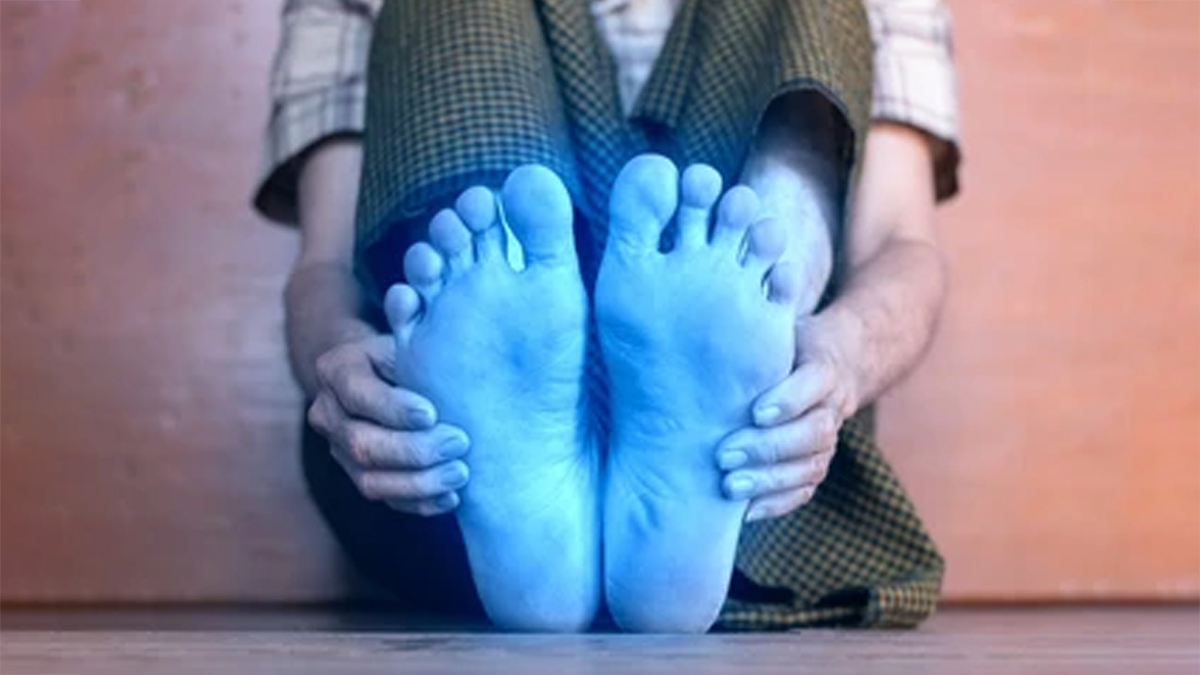
Have you ever found yourself wrapped in a cosy blanket, but your hands feel like ice and your feet feel like they are on fire? You are constantly changing positions, pulling on your socks, wondering why it's happening. It may not seem like much, but this combination of cold hands and hot feet isn't an accident, it may be your body trying to communicate something significant.
Table of Content:-
Temperature imbalance in different body parts isn’t always random. They can sometimes indicate health problems that need attention. Here’s what it could mean when your hands feel cold while your feet feel hot.
What Causes Cold Hands But Hot Feet?
1. Poor Circulation

Cold hands usually indicate poor circulation of blood. If your body fails to circulate the blood properly, particularly to the hands, they remain cold. Raynaud's disease is one condition that can constrict your blood vessels due to cold or stress, causing the hands to become white, blue, or red, and develop coldness or numbness.
Meanwhile, if your feet are hot, it might be a sign that your circulation is overcompensating in other areas or that there is inflammation or nerve irritation going on down south.
2. Nerve Damage or Neuropathy
Hot feet may also be your nerves sending out an SOS. Peripheral neuropathy, which results from damaged nerves outside the brain and spinal cord, causes burning, tingling, or hot sensations, particularly in the feet. It is prevalent among individuals with diabetes, alcoholism, or vitamin B12 deficiency.
So if your feet are hot, even when they're not in warm environments, and your hands are cold, it may signal an imbalanced nerve response, where your body is firing temperature signals off wrong.
Also Read: Cold Hands And Feet Could Be A Sign Of Iron Deficiency: Why It Happens
3. Hormonal Imbalances
Hormones are the internal thermostat controllers of your body. When they are out of balance, your temperature can go for a toss.
Thyroid diseases are a frequent culprit here. An underactive thyroid or hypothyroidism can result in cold hands and intolerance to cold in general, as the body's metabolism slows down. On the other hand, menopause or perimenopause can result in hot flashes or burning feet caused by fluctuating oestrogen levels.
4. Stress and Anxiety
Have you ever noticed how your palms sweat or your feet feel restless during moments of intense stress? The body responds to anxiety in unexpected ways, including temperature changes. Cold hands can happen due to blood vessels constricting during fight-or-flight mode. At the same time, nerve stimulation may cause your feet to feel warm or even burn.
Temperature imbalance brought on by stress doesn't necessarily mean something's wrong medically, but long-term stress can impact circulation, hormones, and nerve impulses over time.
5. Vitamin Deficiencies
Low levels of nutrients, especially vitamin B12, iron, and magnesium, can impact your nerves and blood vessels. These deficiencies may appear as cold hands and feet, tingling in fingers, or burning feet.
If you’ve been skipping meals, following restrictive diets, or haven’t checked your blood levels in a while, this might be worth investigating.
Also Read: Troubled with cold hands and feet in winters? You should try this!
When to See a Doctor
The occasional cold hands or hot feet following a long day or a cold night is not uncommon. However, if it's frequent, ongoing, or there are other symptoms, such as numbness, fatigue, weight changes, or tingling, it's worth seeking the doctor's advice. It may be indicative of conditions like diabetes, vascular disease, thyroid problems, or nutritional deficiencies.
What You Can Do
- Stay cosy but regulated: Wear socks and hand gloves if necessary, but avoid overheating your feet if they are already warm.
- Move: Exercise regularly increases blood circulation and may assist in regulating temperature.
- Eat: Incorporate foods high in B vitamins, iron, and magnesium. Consider leafy greens, nuts, seeds, legumes, and fortified cereals.
- Regulate stress: Deep breathing, yoga, or short walks can suppress anxiety and strange feelings in your body.
- Watch for symptoms: Keep a diary if this occurs frequently, and identify patterns, such as time of day, eating, or emotional cause.
[Disclaimer: This article contains information for informational purposes only. Hence, we advise you to consult your professional if you are dealing with any health issue to avoid complications.]
Also watch this video
How we keep this article up to date:
We work with experts and keep a close eye on the latest in health and wellness. Whenever there is a new research or helpful information, we update our articles with accurate and useful advice.
Current Version
